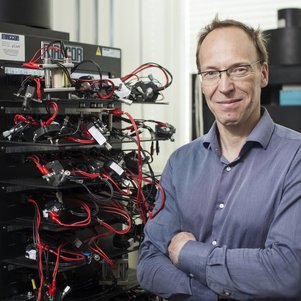TU Delft and RUG/UMCG join forces to develop child-friendly button cell
Every year, around 2,000 children across the world die after swallowing a button cell; the flat 2cm battery found in LED candles, car keys or in battery-operated toys. Keenly aware of the dangers posed by these batteries, researchers from TU Delft, the University of Groningen (RUG) and the University Medical Center Groningen (UMCG) are pushing to develop a child-friendly button cell. Ultimately, their research resulted in a patent application on behalf of RUG/UMCG and TU Delft.
Child-friendly button cell
When you swallow a button cell, it emits an electrical charge that immediately starts dissolving tissue, resulting in permanent injuries or even death. UMCG Cardiothoracic surgeon Tjark Ebels and ENT physician Freek Dikkers joined forces with Delft professor Marnix Wagemaker and Research Technician Frans Ooms to developed a child-friendly version by adding a fuse. When this new button cell is ingested, it automatically switches off the power, preventing serious injury, tissue damage or even death.
"We were shocked to hear how damaging these batteries can be to children and how widespread this problem is. Naturally, we did not hesitate for a moment and used our in-depth knowledge of batteries to come up with a solution.”
Frans Ooms and Marnix Wagemaker
“The wonderful thing about our patented Fused Button Battery system is that it is compatible with all standard button cell manufacturing processes. Now that we have applied for a patent, it is time for a team of professionals to start working on a child-friendly button cell that can take over the market. After all, that is our end goal.”
Tjark Ebels
National Button Battery Awareness Day
12 June is National Button Battery Awareness Day. The initiative was partly inspired by Reese Hamsmith, an American child who would have turned four on 13 June but died at 18 months old after swallowing a button cell. Her mother has since been committed to raising awareness about the dangers of button batteries for young children and promoting safety regulations. In August 2022, President Biden signed 'Reese's Law'.
Swallowed a button cell? Give your child honey and see a doctor immediately!
The doctors have one more tip for parents: “Ironically, used/empty batteries that pile up as they wait to be recycled pose the biggest threat. Don't leave any empty batteries lying around, but get rid of them immediately or keep them out of reach of your children. And if worst does come to worst: have your child eat honey. Fortunately, almost everyone has honey at home. And see a doctor as soon as possible. If you get to a doctor on time, they can help your child and limit the damage.”
For more information on this press release, please contact:
Fien Bosman, Press Officer Health & Care TU Delft: f.j.bosman@tudelft.nl/ 0624953733
Ilse van der Hoek, communications at RUG & UMCG: i.e.van.der.hoek@rug.nl or 06 216 226 31


